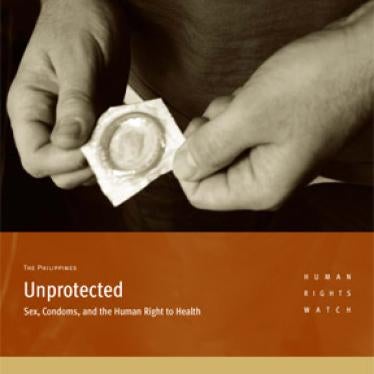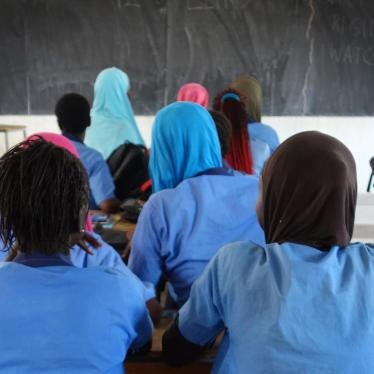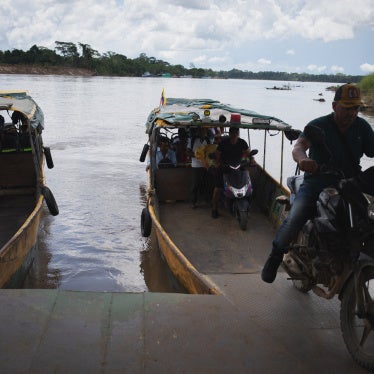(Manila) — The Philippines is courting an HIV/AIDS explosion by pandering to religious objections to condom use, Human Rights Watch said in a new report released today.
The Philippine government’s inadequate HIV-prevention policies put at grave risk large numbers of men, women and children who could contract this incurable disease. Condoms are the only widely available device for preventing sexual transmission of HIV and have proven highly effective when used correctly and consistently.
“The Philippines is courting an AIDS epidemic with its anti-condom approach,” said Jonathan Cohen, a researcher with Human Rights Watch’s HIV/AIDS Program and author of the report. “The casualties will be millions of people who cannot protect themselves from HIV infection.”
In its 70-page report, Unprotected: Sex, Condoms, and the Human Right to Health in the Philippines, Human Rights Watch said that the Philippine government bans the use of national funds for condom supplies. Some local authorities, such as the mayor of Manila City, prohibit the distribution of condoms in government health facilities. School-based HIV/AIDS educators told Human Rights Watch that schools often prohibited them from discussing condoms with students.
In 2003, the Catholic Bishops Conference of the Philippines (CBCP) successfully blocked legislation that would have authorized the use of national funds for condoms and other contraceptive supplies. That same year, the administration of President Gloria Macapagal-Arroyo awarded a P$50 million (U.S.$888,000) contract to an organization, Couples for Christ, to provide “natural family planning” seminars that discourage condom use. Nurses in government health clinics in Manila teach that condoms have holes in them, sources said, a myth that has also been articulated by Vatican spokesmen.
“The argument that condoms have holes in them is itself full of holes,” said Cohen. “The government should immediately counter this false pseudoscience with correct information.”
The report criticizes the Philippines for failing to provide complete HIV/AIDS information to sex workers and other groups at high risk of HIV infection. Sex workers told Human Rights Watch that they rarely use condoms and sometimes question their effectiveness. Other sex workers said police used possession of condoms as evidence to prosecute prostitution. Students who were interviewed said that condoms were only for birth control, reflecting church teachings.
This combination of high-risk sexual practices and low condom use has led experts to fear an HIV/AIDS explosion in the Philippines. The government boasts that HIV/AIDS’ spread in the country is “low and slow”—only 10,000 cases in a country of 84 million.
The United States announced in 2002 that it would no longer donate condoms to the Philippines, causing an unprecedented condom supply crisis. The announcement coincided with the scaling up of U.S.-funded “abstinence until marriage” programs, now a staple of U.S. foreign AIDS policy. Since President George W. Bush took office in 2000, his administration has removed information about condoms from government websites, appointed physicians who oppose condoms as high-level advisers on HIV/AIDS, and opposed references to condoms in United Nations policy documents. The United States opposed a reference to “consistent condom use” at the 2002 Asian and Pacific Population Conference.
“Silence and lies about condoms undermine HIV prevention for all Filipinos, and condom shortages condemn the poorest to facing the highest risk,” said Cohen. “To deny people condoms is to infringe their right to life.”
Human Rights Watch urged candidates in the Philippines’ May 10 presidential election to address the urgent need for HIV/AIDS education, including the importance of condom use as a life-saving prevention tool.






